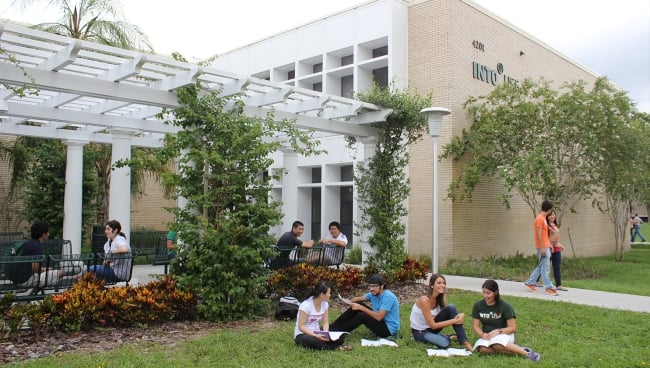You have /5 articles left.
Sign up for a free account or log in.

The University of South Florida is one of the dozen State University System of Florida campuses now accepting the Christian and Western canon–focused Classic Learning Test as an alternative to the SAT.
University of South Florida
The Board of Governors of the State University System of Florida voted Friday to accept the Classic Learning Test, a controversial standardized testing alternative to the SAT and ACT, on applications to its 12 campuses starting this fall.
Florida is the first state higher education system to approve the exam, which focuses on the “classical” Western and Christian canon. Designed in 2015, it has so far been used mostly by Christian colleges and select private institutions like the conservative Hillsdale College and the classics-focused St. John’s College.
The Florida vote passed 13 to 1. The sole objector, faculty representative Amanda Phalin, said the exam had not been sufficiently researched, or even around for long enough, to ensure it was of equal or comparable quality to the SAT or ACT.
In May, Florida governor Ron DeSantis signed a bill requiring the state-funded Bright Futures Scholarship to accept the CLT, opening the door for institutions attended by Bright Futures recipients to do the same. Later that month the New College of Florida—the state system’s liberal arts campus that has been at the center of DeSantis’s mission to reshape higher education—announced it would accept the exam.
In an email to Inside Higher Ed ahead of Friday’s vote, system chancellor Ray Rodrigues, a former Republican state lawmaker whom DeSantis appointed last November, extolled the benefits of the CLT, which he said “expands and engages more students,” and welcomed the prospect of a change to the admissions process.
The move to approve the CLT at Florida’s largest public university system follows a year of right-wing political involvement in the state’s higher education institutions, including a recent spate of conflicts with the College Board, the nonprofit organization that administers the SAT, over Advanced Placement course content.
Many critics of CLT argue it places too heavy an emphasis on biblical passages and traditional Western thought, and that the authors represented are largely white men with questionable positions on race, LGBTQ+ rights and multiculturalism.
“This decision shows that DeSantis doesn’t care about research, education, science or students,” said Akil Bello, senior director of advocacy at the National Center for Fair and Open Testing. “There’s a reason this test is usually used at Bible colleges and seminaries: the point is to be able to identify those who agree with your ideology.”
Jeremy Tate, the CLT’s founder, told said that although the exam’s contents differ broadly from its competitors’, his organization had conducted a concordance study to prove it measures aptitude in a fashion comparable to the SAT.
“The source material is different, and we fundamentally reject the College Board and ACT sensitivity committees that have gotten totally out of control,” he said. “But at the end of the day we’re measuring the same things, and we’ve shown we can do it just as well if not better.”
A spokesperson for the College Board said the CLT’s concordance study contains “inaccurate claims of comparability” with the SAT, and that the board was “not involved in or even made aware of the study.”
“Without addressing several key methodological and comparability issues we have raised to CLT and the Florida Department of Education on multiple occasions, College Board cannot validate the interpretation and use of concorded CLT-to-SAT scores for high-stakes graduation, admission and scholarship decisions,” the spokesperson wrote in an email. “Doing so with an unsound concordance risks harm to students.”
At the Board of Governors meeting, Phalin recommended that the state instruct colleges to collect data on educational outcomes for students who submitted the CLT in their applications “to determine whether it is, in fact, a viable alternative.”
A Fraught Legitimacy
Tate wouldn’t call his trip to Florida last week a victory tour, but in hindsight it sure looks like one.
He was in the Sunshine State in the days preceding the Board of Governors’ vote, visiting state system colleges as part of the Florida SUS Tour, a kind of traveling admissions road show across the state system for high school counselors. Just the fact that CLT was in attendance, at a table right next to the College Board’s, was a kind of coup.
“We could not have been here before this,” Tate said. “We came down thinking not that many folks would know about [CLT]. But I’d say 75 percent of people were at our table at some point. It’s just been slammed with folks wanting more information.”
On Thursday he was at the University of North Florida, and on Friday he headed to the University of Central Florida; by the end of the week, both institutions had agreed to accept his test alongside the SAT and ACT.
After eight years of near obscurity, Tate was looking forward to celebrating his success.
“I’ll be grabbing a cold beer, that’s for sure,” he said.
The Florida system’s approval lends the CLT some newfound legitimacy, and the effects are already showing: Tate said he’s had conversations with multiple other states interested in following suit. He declined to list them but said that all are red states, adding that policy makers in Texas have been watching the test’s progress in Florida especially closely.
Yet he fears that the victory comes with some unwanted political baggage.
“I’m very grateful to the DeSantis administration. But I am worried that now the classical education movement will become perceived as a red-state thing,” he said. “I know folks are saying that CLT is a right-wing operation. That’s not true at all, but you know. Haters gonna hate.”
Tate has made a concerted effort to keep his test above the political fray. He’s gone so far as to enlist Cornel West, a progressive faith leader and 2024 independent presidential candidate, to co-write an op-ed in The Wall Street Journal on the value of the CLT. He also appointed Angel Abrams Parham, a Black professor at the University of Virginia, as the president of the CLT board—a decision he says irked many Christian and conservative supporters.
The CLT is similar to its counterparts in many ways, Tate said; it tests for math skills and basic science education in addition to the literature, religion and philosophy that sets it apart. But what truly differentiates the CLT from the SAT or ACT is its commitment to the classical liberal values of education—as Tate puts it, “a cultivation of virtue.”
The CLT’s critics say virtue is subjective, and the test’s focus on biblical passages and “classical” sources is indicative of an inherent conservatism and a hostility toward cultural and intellectual contributions from historically marginalized groups.
“Framing these things as traditional or classical or Western, to me that simply means old white guys … in truth, what they’re saying is racist, sexist, homophobic—you name it,” Bello said. “It’s just that now you have extremists like [DeSantis-appointed New College trustee Christopher] Rufo saying the quiet part out loud.”
Tate denied any ideological influence on the exam’s content and insisted he’s not trying to convert more Americans: “This is not saying you have to become Catholic,” he said, “though I wish you would.” At the same time, he didn’t shy away from defending the kinds of editorial choices the CLT has been roundly criticized for.
“For people who are inheriting our system of government, that inheritance is largely English and influenced by the West, the texts that influenced America’s founding generation,” he said. “We believe those still need to have pre-eminence in education today.”
The Death Knell of the Standardized Test?
Florida’s state system is the largest in the country that still requires applicants to submit standardized test scores. Along with Georgia and Tennessee, it’s also one of the last.
Many higher ed institutions have come to question the sector’s attachment to standardized tests, and Bello said Florida’s acceptance of the CLT is another blow to the exams’ standing—and a feather in the cap of the test-optional movement.
“Any serious consideration of CLT puts a black eye on higher ed as a whole,” he said. “But it also offers an opportunity to shine a light on the falseness of this idea of measuring meritocracy and to show how standardized tests are not actually research-driven or for the benefits of students; they’re reinforcements of the beliefs of those who have the ability to require them.”
The question is, will Florida’s high-profile platform lead to a national CLT wave? Bello wagers not.
“I’d be shocked if anyone is talking about this test in two years,” he said. “Its popularity will wane with the political tides, because that’s all this is about.”
Tate was confident, however, not only that CLT could stand as an equal beside the SAT and ACT, but that it will one day soon eclipse them.
“We’re going to be No. 1. We think that we’ve got a better vision for education. So the goal is to win,” he said. “And the groundswell is starting … this is an educational movement that’s getting too big to ignore.”





